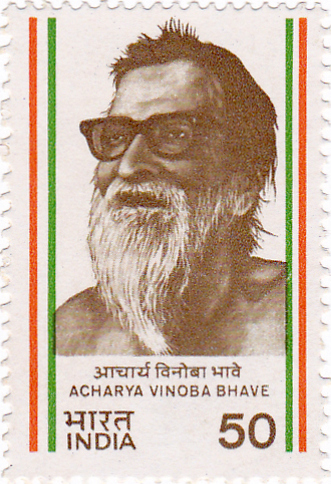Vinoba Bhave and the Bhoodan Movement

Credit: India Post, Government of India Permission (Reusing this file)
Licence: National Data Sharing and Accessibility Policy (NDSAP) of the Government of India, GODL-India
15 November 1983
| Giver: | Individual |
|---|---|
| Receiver: | Individual or unstructured/informal group |
| Gift: | Land, Other |
| Approach: | Other |
| Issues: | 1. No Poverty, 10. Reduced Inequalities |
| Included in: | Social Activism |
Vinoba Bhave (1895-1982) was an influential Indian social reformer and activist. Widely acknowledged as the spiritual heir to Mahatma Gandhi, he sought to fulfill Gandhi's vision for a sarvodaya (universal upliftment) society in which truth, ahimsa (non-violence), love, cooperation and good faith give rise to social equality and the improved welfare of all. In service to this vision, in 1951 Bhave launched the Bhoodan (land gift) Movement, an appeal to property owners to donate a portion of their holdings to the landless. Vinayak Narahari Bhave (later nicknamed Vinoba) was born in 1895 in Gagode, in what is now the Kolaba district of Maharashtra. The eldest son in a family of Brahmins – (the highest caste in Hindu society – he was deeply influenced by his grandfather, who introduced him to devout spiritual practice.
In 1916 Bhave joined Gandhi’s ashram (ascetic community) at Sabarmati, near Ahmedabad. Devoting himself wholly to Gandhi’s teachings and demonstrating a pureness of spirit, he earned recognition as an outstanding disciple. In 1921 Gandhi sent Bhave to Wardha, a rural area in central India, to establish a new ashram called Sevagram.
Bhave remained in Wardha until 1951, immersing himself in scriptural study, teaching and “constructive work” associated with Gandhi’s program to build economic self-reliance among villages. During these years he was also jailed several times for his participation in Gandhi’s civil disobedience actions against British colonial rule, as well as Britain’s efforts to mobilize India for World War II.
When Gandhi was assassinated in 1948 -- less than a year after India gained its independence – Bhave and other disciples continued the work of building a sarvodaya society. As the post-colonial era began, communist-led peasant movements were demanding land reforms to address social and economic inequalities entrenched by centuries of feudalism, a system that concentrated land ownership in the hands of a small nobility, while oppressing and exploiting lower-class vassals. Although the government introduced various policies to redistribute land, Bhave did not believe an egalitarian society could be achieved through legislation. Rather, he contended, real social and economic progress would require a change of heart, whereby people were inspired to sacrifice a share of their possessions out of love for their fellow man.
Bhave sought to inculcate this spirit of generosity through the Bhoodan Movement. In 1951 he embarked on what became a 13-year padayatra (walking pilgrimage), traveling from village to village to campaign for land donations. Hundreds of thousands of landowners responded, giving up more than 4 million acres. Although the movement fell short of its goal of transferring 50 million acres to formerly landless people for agricultural cultivation, it remains a powerful demonstration of the potential to galvanize non-violent social transformation through selfless giving.
Bhave lived out the last years of his life in meditation, contemplation and prayer at Brahma Vidya Mandir, a women-run ashram that he established in 1959. Following his death in 1982 he was posthumously awarded the Bharat Ratna, India’s highest civilian honor.
Contributors: Maha Tazi, Erin Brown
| Source type | Full citation | Link (DOI or URL) |
|---|---|---|
| Book |
Bhave, Vinoba. Moved by love: The memoirs of Vinoba Bhave. Green Books, 1994. |
- |
| Publication |
Church, Roderick, and Erica Linton. “The Impact of Bhoodan and Gramdan on Village India.” Pacific Affairs 48, no. 1 (1975): 94. |
https://doi.org/10.2307/2755451. |
| Publication |
Copley, Antony R. H. “Bhave, Vinoba (1895–1982), Spiritual Leader in India.” Oxford Dictionary of National Biography, 2004. |
https://doi.org/10.1093/ref:odnb/62512. |
| Publication |
Jannuzi, F. Tomasson. “7. The Movement for Bhoodan (Land Gift).” In Agrarian Crisis in India, pp. 93-128. University of Texas Press, 2021. |
- |
| Publication |
Mandal, Bimal Kumar. “Bhoodan Movement of India and its Impact.” In Proceedings of the Indian History Congress. 837-843. Indian History Congress, 2015.. |
- |